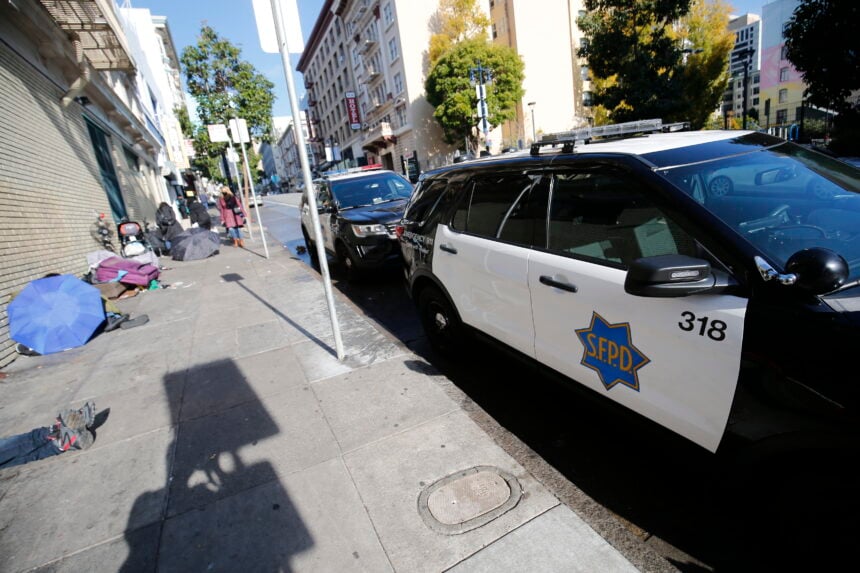
San Fransicko: Why Progressives Ruin Cities
by Michael Shellenberger
Harper
416 pp., $28.99
The last time I was in San Francisco, more than 10 years ago, my wife and I encountered a deranged and dangerous homeless man. He asked us for money and immediately started threatening and following us when we declined. He was the most egregious of many aggressive panhandlers we had to dodge as we walked the city’s streets. In large part because of such experiences, we have not gone back.
Michael Shellenberger gives an insightful, heartbreaking account of how much worse things have gotten there recently, thanks to decades of progressive policy. Outsiders are hard-pressed to fully understand how profoundly the worst radical ideas have corrupted cities like San Francisco, from the highest levels on down.
One individual illustrative of the decay is the city’s former district attorney, Chesa Boudin. Before he was ousted from office in July, Boudin championed the decarceration efforts that have crippled law enforcement. Boudin is the son of two former Weather Underground terrorists. Shortly after his birth, his parents were convicted of participation in a Brink’s truck robbery and shoot-out with police that resulted in the deaths of two officers and a Brink’s driver. When his parents were apprehended, the one-year-old Boudin was sent to live with family friends, who became his adoptive parents. They were Bernardine Dohrn and Bill Ayers, also Weathermen. They had organized and participated in some of that group’s bombings of police and military sites. Boudin has not taken his revolution to the barricades, as his parents and adoptive parents did, but his politics are not at all far from theirs.
Shellenberger ably summarizes a few bits of contemporary radical intellectual history to show the roots of the perverse ideas about criminality, drug abuse, and mental illness held by San Francisco’s political elite. The anti-madness intellectual wave of the 1960s and 1970s, especially Michel Foucault’s work, which envisioned mental illness as a sacred category, set the stage for a descent into relativist lunacy.
In fact, a good number of the French intellectuals who contributed most substantially to the dissolution of the concept of madness themselves gave plentiful evidence of their own psychopathology. During visits to San Francisco, Foucault engaged in anonymous sadomasochistic homosexual sex in the city’s bathhouses. This is probably how he contracted the HIV that killed him. Gilles Deleuze allowed his fingernails to grow into lengthy claws and committed suicide by leaping out his apartment window. Deleuze’s writing partner, Félix Guattari, suffered from severe depression much of his life. Mental illness was not just an academic pastime for many in this group; it was a personal struggle.
In addition to recalling the anti-madness movement, Shellenberger describes the intellectual drift away from class-based analysis toward more radical understandings of poverty. In the previously dominant Marxian view, social class was the key to understanding power and the marginalized. But in the 1960s, many on the American intellectual left rejected the working class and embraced the criminal element that Marx vigorously criticized as the lumpenproletariat. These are, in Marx’s terms, the “dangerous classes,” the “vagabonds … discharged convicts … swindlers, charlatans, lazzaroni, pickpockets, tricksters, gamblers, procurers, brothel keepers … rag-pickers … [and] beggars,” who exist parasitically on the fringe of both bourgeois and working classes.
The most basic progressive idea, Shellenberger explains, is that society should be organized around the needs of its most downtrodden: in other words, the lumpenproletariat. All must be shaped to accommodate the criminals, addicts, and mentally ill who exist at the margins of normal society. This kind of thinking manifested in the black radical prison movement of the early 1970s, and it persists today in varied strands, such as Antifa and BLM.
It is shocking to reflect on how widespread such ideas have become in contemporary America. I have heard it claimed on the campus where I teach that homeless people are being murdered by the states in which they reside when those states change the design of public benches to prohibit them from being used as beds. Public policy, in other words, must conform to every inclination of the socially deviant.
The illogicality of San Francisco’s political culture is visible in the different policy approaches to tobacco smoke and use of narcotics. Much legislation and municipal policy concerns the minor dangers associated with second- and third-hand exposure to cigarette smoke. Meanwhile, as Shellenberger describes, there are billboards in the city promoting the “safe use” of fentanyl and heroin, with groups of addicted friends cheerfully using together.
Drug addiction and mental illness are central problems in homeless populations, and San Francisco has no idea how to effectively deal with the situation. Shellenberger recounts harrowing stories of mentally deranged individuals assaulting others in public and how these incidents are overlooked by law enforcement and medical services alike. These are the fruits of the madness of anti-madness philosophy.
The abject moral evil that exists in much of the drug trade is glaringly obvious. Shellenberger relates a disturbing tale of one particular dealer who describes having gotten a young female friend hooked. She abandoned her children and took to selling sex on the street to pay for her habit. The dealer admits to some abstract remorse for the deed, but a sane society would make him pay for it, and in spades. If we did so, a dangerous threat would be removed from our midst, and a strong message would be sent to others contemplating such a path. But when you have jettisoned the very notion of objective evil, there can be no such resolution.
There is considerable evidence that mandatory treatment of addiction is more successful than methods that leave the decision-making to the addicts. Unfortunately, “bodily autonomy” is mindlessly invoked to reject that approach. That such a rejection constitutes a de facto partnering with major pharmaceutical corporations, which have heavily profited from the sale of opioids, is blithely overlooked by progressives, who claim to oppose “Big Pharma.”
The racial element of homelessness in San Francisco is hard to miss. Only 6 percent of the city’s population is black, but blacks are almost 40 percent of the homeless. It is asserted that only racism could produce such a perverse fact. But racism cannot be the cause of rising addiction and homelessness. The two have increased precisely during a period in which the manifestations and consequences of racism, especially their effect on racial disparities in wealth and income, have steadily declined.
The real causes of homelessness are linked to the failures of progressivism’s view of human nature. Poor individual choices—made in a social and cultural context wherein no effort to regulate, denounce, and punish transgressions is permissible—will inevitably yield negative ends. Shellenberger cites one black, former homeless respondent making the point bluntly: “The streets didn’t choose me; I chose the streets.” This man admirably admits the moral irresponsibility of the decision-making framework that led him to a life of crime, addiction, and homelessness. That this perspective can barely be hinted at in our public debate without a shrieking denunciation is an indication of our inability to handle the truth.
The basic problem Shellenberger outlines was diagnosed more than a century ago by the founder of modern sociology, Émile Durkheim. He argued that anomie, or normlessness, is a major problem in modern societies. Humans have a natural tendency toward insatiable desires. Absent regulation, we will incessantly pursue things we cannot obtain. We will be thereby condemned to a perpetual state of unhappiness.
Nothing in our organic or psychological constitution enables us to fully regulate such desires. We need a source outside ourselves to do the required work. Only society can fulfill this function, in Durkheim’s view, since its moral power is superior to the individual and recognized by the individual as such. But the progressive outlook sees as illegitimate any external efforts to mold or control individual behaviors that can be understood as expressions of identity. The progressive view of human nature, therefore, could scarcely be more antisocial and allergic to the only means for controlling anomie.
Policy in San Francisco allows almost no role for moral regulation from outside the individual. Unrelenting hostility to law and order drives the worldview behind that policy. A former police officer succinctly expresses the impossible situation into which police are thrown:
Everyone was mad … the homeowners would get mad because you didn’t move the homeless who were sleeping in front of their house. Then, when you tried to help the homeless, someone would start yelling about police brutality. And everyone had a cell phone camera on you.
Now, who would want that job? No one? In progressive San Francisco, maybe that’s the point.

Leave a Reply